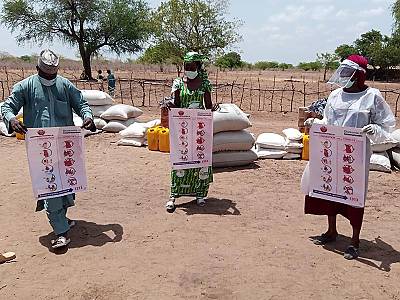Hindou Oumarou Ibrahim is an indigenous woman from the Mbororo pastoralist community in Chad. She recently spoke with the Living Heritage Team in UNESCO’s Culture Sector about how her community is coping with the COVID-19 pandemic and its impact on their way of life.
How is the coronavirus pandemic affecting your community and its living heritage?
I am very scared for my community because we’re mainly pastoralists and we depend on the seasons. When it is the dry season, we migrate to other regions and sometimes to other countries – actually most of the time – then we come back to our region or to our country. So, with the lockdown of frontiers and regions, a lot of cattle will be stuck and not able to cross the border. While the ecosystem of the Sahel is very fragile, you can’t manage it, it will be very bad… all the cattle will die, communities will fight among themselves to access the resources, there will not be enough water to drink. These are really the big consequences that I am scared of. We can’t control the season, just as we can’t control the coronavirus. We can’t just say that now we will stop the rainy season until this pandemic is finished so we can produce the pasture or produce the water.
Another consequence is that people do not have access to clean water to drink so they can’t access clean water to wash their hands. You can’t ask them to use soap every four hours, it’s completely impossible. And while they do not have access to the market to exchange their products, food security is a big concern; it is a big consequence and it will damage the very fragile people who are there.
There is also a lack of information on the pandemic for the community. All the information given in town, is given through social media, TV, radio and in the major languages: Arabic and French. But people do not always speak Arabic or French, so they can’t get access to this information. They do not know what to do, they do not know what is happening, so they can’t avoid the sickness.
How do you and your community cope with this lack of information?
We are using the traditional songs or poetry, which are adapted to the current situation, in order to convey the messages about Covid-19. In this way, we tell people to wear masks, not to move during the lockdown, where they can get food, etc.
I also designed some posters to raise the awareness about the importance of wearing the masks. I can also share those posters with other communities to teach them how to well protect themselves and others.
How can culture and heritage be a source of resilience during such a crisis?
People are turning to their traditions and traditional medicine. We always use our traditional medicine to heal ourselves. For us in the community, if you have a fever, or if you have a headache there are some plants that you can use. We can’t maybe heal COVID-19, but people turn a lot to traditional medicine to heal the symptoms that they have in their daily lives. While they can’t go to the hospital because everything is in lockdown, they protect and turn to the traditional knowledge that they do have. I found it very interesting because even the modern medicine is based on plants in the Earth and this can maybe also help people to protect the environment they are living in. They are doing this a lot in the community and hopefully those people that have that knowledge can share it with others and it can be one of the solutions.
Another example, when I was talking to one community chief, is about supporting each other when old people need more support. So, when people have food, they need to take it to the more vulnerable. That’s the wonderful culture of the community: you can’t eat alone, if you have food and someone does not, you have to decide to prioritise the kids first, then the old people. This culture of sharing is so useful, even before COVID-19, and now people are coming back to this kind of culture.
Do you have a message for other living heritage stakeholders and communities about the future after the pandemic?
Looking forward, I think the crisis has made us value our humanity and give us hope. We understand the need to live all together and the fact that we rely on each other. Living in solidarity, harmony, sharing within families and across communities. This protects our health and also the environment.
Les désignations employées et la présentation des textes et des documents référencés dans cette plateforme n'impliquent de la part de l'UNESCO aucune prise de position quant au statut juridique des pays, territoires, villes ou zones, ou de leurs autorités, ni quant au tracé de leurs frontières ou limites.
